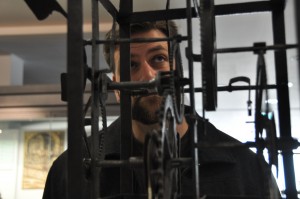So, the days of my first 8-week intensive German class are wrapping up. Hard to believe that it has been two months already! I can’t say that I make perfect sentences, pronounce words as they are intended, or have the vocabulary to articulate all my thoughts, but I have definitely improved since the day we landed in Deutschland. As long as I am talking to a German-learner at the same level as me…the conversation can go on all night…and it has!
Needless to say, by this time my classmates are pretty comfortable with each other and are used to using a lot of different methods to make their ideas known to all. It all must be in German, because our teacher doesn’t want to hear anything but German and has a “No Mother Languages” rule. Our favorite words: warum? (why?), ich weiß es nicht! (I don’t know it), and genau (exactly).
One day last week, we are sitting around during a break and I come to learn that several of my classmates have huge crushes on our teacher. They are explaining (in beginner German) how they could not focus for the first several days because they were smitten, how they are tired of constantly hearing about our teacher’s wife, how they stay up late at night talking about him, etc. etc. Basically, every elementary-level German verb and vocabulary word was used to describe their feelings about our teacher. It was hilarious!!
Several of us ladies planned a dinner to commemorate our accomplishments thus far. Adhering to the “No Mother Languages” rule was not going to be a problem because the Valencian spoke only German and Spanish, one Italian spoke only German and Italian, the other Italian spoke Italian, English, and German, and then there was me. We were lucky to get a table at the restaurant and there is a weird little bed in the corner near us. Warum? Ich weiß es nicht!
I’m sure that listening to our conversations is thoroughly entertaining. I know that people laugh at us…I have seen them. I see them laugh at us on the street, on the train, in restaurants. Oh well! We were all on a train together a few days prior and the Valencian was trying to tell me, “My heart beats only for you”. (“Warum” you ask? “Ich weiß es nicht”. People say weird things when they speak at a kindergarten level.) She got as far as the “you” part and then struggled. “Dir? Dich? Du?” The old lady next to us was laughing…out loud! I then proceeded to have a 5 minute conversation with her; starting with “Wir lernen Deutsch” (We’re learning German). She talked and talked and then asked where we were all from. Great! A question we knew!! We were best friends before she left.
Back to the restaurant. What is funny is that our conversations include the words “comma”, “neben satz (secondary sentence), and “bling! dativ” (a trick our teacher uses to get us to remember to use the dativ form) so that everyone else can understand what is intended. There are also hand motions that indicate to the listeners to be patient because the remainder of a verb or the past tense of a verb is still to come. The conversation eventually turned to our teacher. How sad the girls would be not to see him “jeden Tag” (every day). The strange bed next to our table had integrated itself into every topic of discussion, so of course it was used to help the Italian communicate her feelings for our teacher. Ahhh…the dreaded location prepositions. Was she in the bed, on the bed, over the bed, under the bed, or at the bed, with our teacher? Ich weiß es nicht!
So I ask the waitress (I am the only one is class willing to ask total strangers for grammar corrections, if you have not deduced that already): “auf dem Bett”? Her response: “Genau”. Ahhh…hearing that word is like having the dentist say you are cavity-free. Sweet relief! On the bed. You are never “in” the bed in German, unless you are made of wood or got sucked into the mattress-machine. What was really funny is that during our meal we had to put our salad plates on the bed because there was no room on the table. The waitress came by and asked if she could take the plates auf dem Bett (on the bed)! Sure you can! We all had a good laugh about that…including the waitress.
Hopefully my next class will have characters just as dynamic as these. Regardless, it has been a trip!



